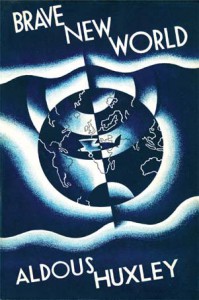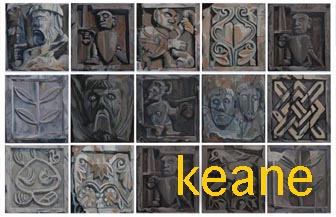 One of the most wonderful aspects of our small but active book club is its platform for launching flights of thought and ideas. Whether it is in the research of the author’s background or other titles, or the historical or social significance of the book there are always many interesting topics put on the table.
One of the most wonderful aspects of our small but active book club is its platform for launching flights of thought and ideas. Whether it is in the research of the author’s background or other titles, or the historical or social significance of the book there are always many interesting topics put on the table.
On the coldest December evening thus far we stepped from the cobblestone via into the old world warmth of a medieval palazzo to a sumptuous meal at the long narrow dark heavy wood table, beautifully laid in deep red with cut crystal wine goblets and white china, before discussing the contemporary implications of the novel Brave New World, by Alduous Huxley.
At Oxford, tutored by H.G. Wells, Huxley, originally inspired to write a parody of the period’s popular future utopia novels, wrote instead a dystopian saga which resonates 75 years later. Contemporary themes of societal control, genetic engineering, bioethics, coercive consumerism, drug use and sexual promiscuity are explored.
Huxley was a member of several hedonistic societies and explored and experimented with LSD and mescaline, in addition to being prescribed antidepressants. A trip to the United States, and an inadvertent study of the writing of Henry Ford on industrialization, mass production and consumerism as a key to peace, strongly influenced his pessimistic outlook for the future of Europe and inspired him to write Brave New World with America in mind.
The society consists of a genetically engineered hierarchy of consumers. Consumerism being the new religion, everyone was inculcated in the process of goods to make, buy, use and throw away. Today the practice can be seen in the elaborate advertising schemes and pressure to buy on too easily available credit which has resulted in seriously undermining world wide financial systems.
Brave New World is a novel written in 1931 by Aldous Huxley and published in 1932. Set in London of AD 2540 (632 A.F. in the book), the novel anticipates developments in reproductive technology and sleep-learning that combine to change society. The future society is an embodiment of the ideals that form the basis of futurology. Huxley answered this book with a reassessment in an essay, Brave New World Revisited (1958) and with his final work, a novel titled Island (1962).
In 1999, the Modern Library ranked Brave New World fifth on its list of the 100 best English-language novels of the 20th century. In 2003, Robert McCrum writing for The Observer listed Brave New World number 53 in “the top 100 greatest novels of all time” and the novel was listed at number 87 on the BBC’s survey The Big Read. – source – Wikipedia
As panacea and to alleviate stress and anxiety the mood enhancing fictional drug Soma was used routinely. Its relevance today can be felt in the alarming use of psychoactive drugs to enhance, modify or control the behaviour of adults but most disturbingly that of a growing number of children. The production of Ritalin, the drug of choice to control a variety of behavioural issues in children, has increased 500% in five years. An estimated 5% of boys and 2% of girls in the United States, are prescribed these drugs beginning with children as young as 3 to 4 years of age. Young adults and adults are using them for memory and mental performance enhancement. This does not even begin to address the serious abuse of performance enhancing drugs.
The regulated and controlled society forbid any engagement in arts or literature, especially the work of Shakespeare from which the title is borrowed. Family connections were eliminated through genetically engineered reproduction which brings us to the main plot in the story when two characters go on vacation to the world at large and find two refugees from the colony. The two refugees, one the paternal offspring of a member of the colony, return and confusion and chaos ensue through the introduction of a blood relative.
It was not an easy read. The almost textbook descriptions of scientific endeavours were a slog. All in all, those who read and enjoyed it did so with an eye to its relevance today.
Thank you very much to Liz and everyone who contributed delicious food and introduced well researched thought provoking ideas to the table.
The book we will discuss on January 23rd will be The Sense of an Ending by Julian Barnes.
The book for February is Why Be Happy When You Can Be Normal, by Jeanette Winterson
March’s book selection is My Cousin Rachel, by Daphne du Maurier and April will be discussing Lady Chatterley’s Lover by D. H. Lawrence.
We look forward to lively discussions.
Barga Book Club site can be seen here




